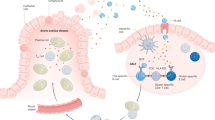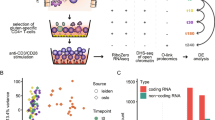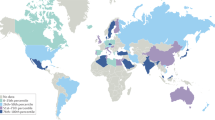Abstract
Coeliac disease is an autoimmune disorder, characterised by villous atrophy of the small intestine, which results from a T-cell-mediated response to gluten-derived peptides. The cytotoxic T-lymphocyte-associated protein 4 (CTLA-4) is involved in the regulation of T-cell activation and the CTLA4+49 A/G polymorphism in exon 1 has been implicated in several autoimmune disorders, including coeliac disease. However, this polymorphism was recently excluded as being the causal variant in Graves' disease, autoimmune hypothyroidism and type I diabetes mellitus. This causal variant was mapped to the 3′ region of CTLA4, with the CT60 polymorphism showing the strongest association. The aim of this study was to determine the role of the CTLA4 gene in coeliac disease in the Dutch population. The +49 A/G and CT60 polymorphisms were genotyped in a case–control cohort of 215 patients and controls. The frequency of the +49 G-allele was increased in cases, although not significantly. However, the frequency of the CT60 G-allele was increased with borderline significance in coeliac disease patients (P=0.048), although the genotype distributions did not show a significant difference between cases and controls. These results indicate the involvement of the CTLA4 gene in coeliac disease development. The haplotype carrying the CT60 G-allele was shown to be associated with lower mRNA levels of the soluble CTLA-4 isoform, providing a possible mechanism for the T-cell-mediated destruction of the small intestine.
Similar content being viewed by others
Log in or create a free account to read this content
Gain free access to this article, as well as selected content from this journal and more on nature.com
or
References
Sollid LM : Molecular basis of celiac disease. Annu Rev Immunol 2000; 18: 53–81.
Schuppan D : Current concepts of celiac disease pathogenesis. Gastroenterology 2000; 119: 234–242.
Louka AS, Sollid LM : HLA in coeliac disease: unravelling the complex genetics of a complex disorder. Tissue Antigens 2003; 61: 105–117.
Greenfield EA, Nguyen KA, Kuchroo VK : CD28/B7 costimulation: a review. Crit Rev Immunol 1998; 18: 389–418.
Marron MP, Raffel LJ, Garchon HJ et al: Insulin-dependent diabetes mellitus (IDDM) is associated with CTLA4 polymorphisms in multiple ethnic groups. Hum Mol Genet 1997; 6: 1275–1282.
Donner H, Rau H, Walfish PG et al: CTLA4 alanine-17 confers genetic susceptibility to Graves' disease and to type 1 diabetes mellitus. J Clin Endocrinol Metab 1997; 82: 143–146.
Heward JM, Allahabadia A, Armitage M et al: The development of Graves' disease and the CTLA-4 gene on chromosome 2q33. J Clin Endocrinol Metab 1999; 84: 2398–2401.
Donner H, Braun J, Seidl C et al: Codon 17 polymorphism of the cytotoxic T lymphocyte antigen 4 gene in Hashimoto's thyroiditis and Addison's disease. J Clin Endocrinol Metab 1997; 82: 4130–4132.
Harbo HF, Celius EG, Vartdal F, Spurkland A : CTLA4 promoter and exon 1 dimorphisms in multiple sclerosis. Tissue Antigens 1999; 53: 106–110.
Kristiansen OP, Larsen ZM, Pociot F : CTLA-4 in autoimmune diseases – a general susceptibility gene to autoimmunity? Genes Immun 2000; 1: 170–184.
Djilali-Saiah I, Schmitz J, Harfouch-Hammoud E, Mougenot JF, Bach JF, Caillat-Zucman S : CTLA-4 gene polymorphism is associated with predisposition to coeliac disease. Gut 1998; 43: 187–189.
Naluai AT, Nilsson S, Samuelsson L et al: The CTLA4/CD28 gene region on chromosome 2q33 confers susceptibility to celiac disease in a way possibly distinct from that of type 1 diabetes and other chronic inflammatory disorders. Tissue Antigens 2000; 56: 350–355.
Popat S, Hearle N, Wixey J et al: Analysis of the CTLA4 gene in Swedish coeliac disease patients. Scand J Gastroenterol 2002; 37: 28–31.
Ueda H, Howson JM, Esposito L et al: Association of the T-cell regulatory gene CTLA4 with susceptibility to autoimmune disease. Nature 2003; 423: 506–511.
Clot F, Fulchignoni-Lataud MC, Renoux C et al: Linkage and association study of the CTLA-4 region in coeliac disease for Italian and Tunisian populations. Tissue Antigens 1999; 54: 527–530.
Holopainen P, Arvas M, Sistonen P et al: CD28/CTLA4 gene region on chromosome 2q33 confers genetic susceptibility to celiac disease. A linkage and family-based association study. Tissue Antigens 1999; 53: 470–475.
Popat S, Hearle N, Hogberg L et al: Variation in the CTLA4/CD28 gene region confers an increased risk of coeliac disease. Ann Hum Genet 2002; 66: 125–137.
van Belzen MJ, Meijer JW, Sandkuijl LA et al: A major non-HLA locus in celiac disease maps to chromosome 19. Gastroenterology 2003; 125: 1032–1041.
Acknowledgements
We thank Winny van der Hoeven and Alfons Bardoel for collecting the cases and controls, Jos Meijer for re-evaluating the initial biopsy specimens of the patients included in this study and Jackie Senior for improving the manuscript. This study was supported by a grant from the Netherlands Digestive Diseases Foundation (WS 97-44).
Author information
Authors and Affiliations
Corresponding author
Rights and permissions
About this article
Cite this article
van Belzen, M., Mulder, C., Zhernakova, A. et al. CTLA4+49 A/G and CT60 polymorphisms in Dutch coeliac disease patients. Eur J Hum Genet 12, 782–785 (2004). https://doi.org/10.1038/sj.ejhg.5201165
Received:
Revised:
Accepted:
Published:
Issue date:
DOI: https://doi.org/10.1038/sj.ejhg.5201165
Keywords
This article is cited by
-
Targeted modification of wheat grain protein to reduce the content of celiac causing epitopes
Functional & Integrative Genomics (2012)
-
The shared CTLA4-ICOS risk locus in celiac disease, IgA deficiency and common variable immunodeficiency
Genes & Immunity (2009)
-
Meta-analysis of genome-wide linkage studies across autoimmune diseases
European Journal of Human Genetics (2009)
-
Searching for genes influencing a complex disease: the case of coeliac disease
European Journal of Human Genetics (2008)
-
Genetic Polymorphisms of LMP/TAP Gene and Hepatitis B Virus Infection Risk in the Chinese Population
Journal of Clinical Immunology (2007)



